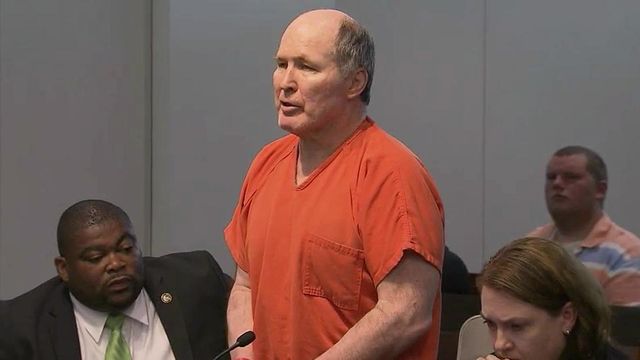Durham man receives 15-20 years in prison for securities fraud
A Durham man accused of taking more than $1 million from educators through fraudulent investments will spend 15 to 20 years in prison after he pleaded guilty Monday to more than 40 charges of securities fraud, common law forgery and common law uttering.
Posted — UpdatedWalter Reinhardt, 64, admitted Monday to soliciting investments from 16 victims in the Durham area between November 2005 and May 2009 for a variety of failing businesses that were owned by Bud Johnson, a Richmond, Va., man, who has since been convicted of federal fraud charges.
Reinhardt has been in jail since his arrest in 2010 and will receive credit for time served.
Reinhardt, whose trial began last week in Durham, talked his way into faculty meetings at schools and would then persuade teachers that they could earn 8 to 10 percent interest over four years if they invested with him, according to Zesley Haislip Jr., a senior enforcement attorney for the Securities Division of the North Carolina Department of the Secretary of State.
In some cases, investigators believe Reinhardt cut and pasted clients' signatures to agreements without their authorization to invest their money. In other cases, he prayed with his victims in meetings to gain their trust.
Haislip said that there are believed to be another 37 victims in North Carolina who lost an additional $2 million.
Reinhardt, an unlicensed investment adviser, received approximately $216,000 in commission between 2005 and 2009, as well as a $4,000 monthly salary, Haislip said.
The National Association of Securities Dealers barred Reinhardt in 2001 from selling securities, and the state issued a cease-and-desist order against him in 2007 for the unregistered sale of securities.
Defense attorneys, however, said their client knew he made mistakes but not to the extent the state claims. They said he didn't know what he was doing was illegal and that he thought the 2001 and 2007 actions against him were temporary.
"I regret that my actions in raising money for Bud Johnson's companies led to hardship and loss of money for my clients," Reinhardt said during his sentencing hearing Tuesday. "I sympathize with their predicament and wish that I had not been involved or had been a better steward of their assets."
Three of his 16 victims testified Tuesday morning that their dreams of retirement were dashed when Reinhardt – whom they described as kind and knowledgeable – quickly earned their trust and then lost their money.
"He put me in an investment that I did not know about, where he forged my name," said Ramona Clark, an associate professor at North Carolina A&T University in Greensboro whose family lost approximately $200,000. "That really did something to me. I lost trust. I lost faith. It's hard for me. I lost dignity. I felt stupid. Just stupid."
Clark said she had invested to prepare for retirement and wanted to put aside any potential earnings from home health care and for her grandson's college education.
Ann Breakfield, an educator in New York City who retired to Durham, said she lost more than $100,000 and is now living paycheck-to-paycheck.
"Our credit – we couldn't buy a toothpick because Walter has stolen our money," she testified. "He's slick."
Anyone can call the Securities Division at 800-688-4507 to find out if a broker is licensed to sell securities in the state.
"A phone call would have revealed that Mr. Reinhardt was not registered to sell securities, which should always raise a red flag with potential investors," she said.
• Credits
Copyright 2024 by Capitol Broadcasting Company. All rights reserved. This material may not be published, broadcast, rewritten or redistributed.






